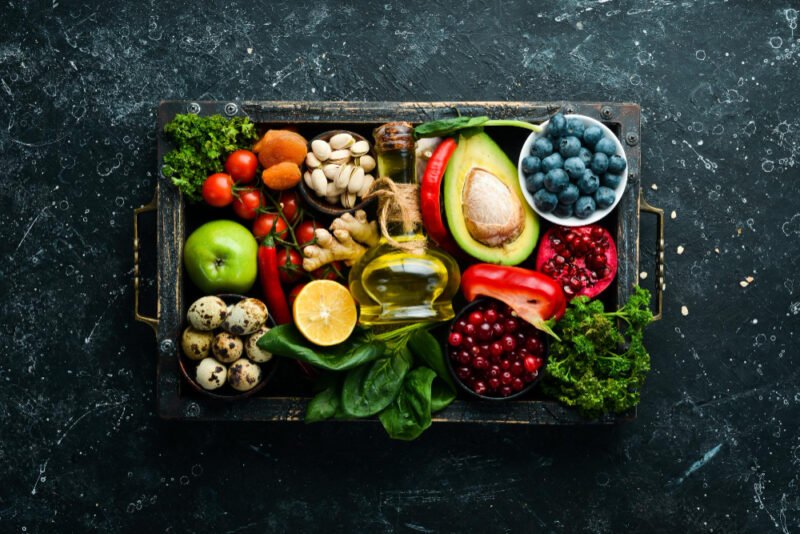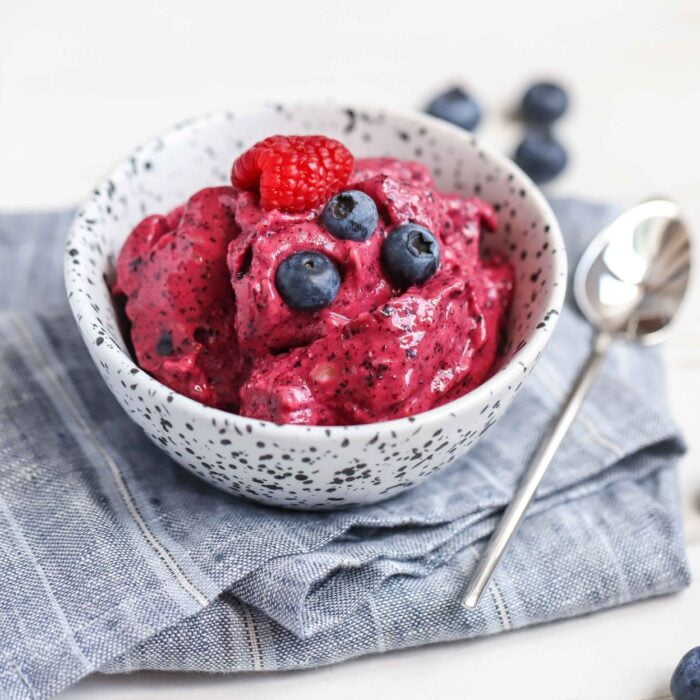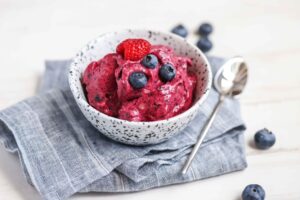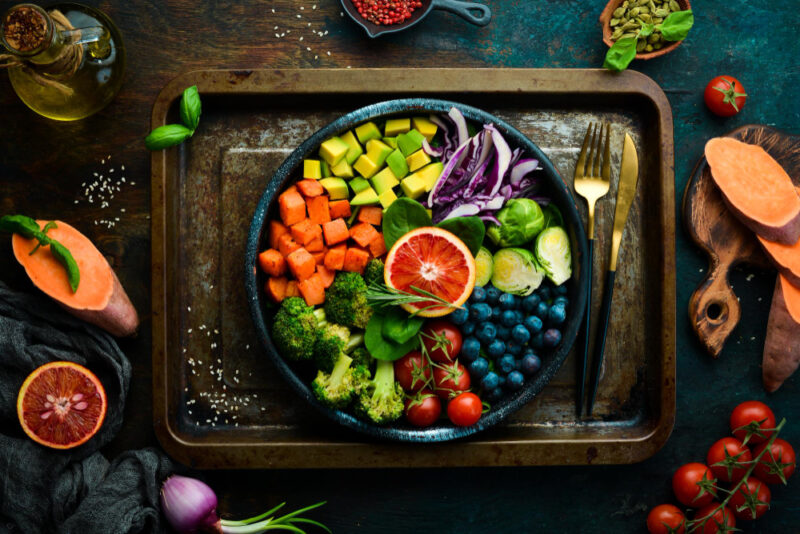We should be eating more antioxidant-rich food than we currently are.
Antioxidant-rich foods are crucial in promoting overall health and well-being due to their ability to combat oxidative stress and inflammation. Oxidative stress occurs when there is an imbalance between free radicals and antioxidants in the body, leading to cellular damage and an increased risk of chronic diseases such as cancer, cardiovascular disease, and neurodegenerative disorders.
They help neutralize free radicals, protecting cells from damage and reducing disease risk.
Research published in the journal Antioxidants & Redox Signaling highlights the importance of antioxidants in maintaining cellular health and preventing oxidative damage.
Consuming a diet rich in antioxidants has been linked to reduced inflammation, improved immune function, and enhanced cognitive function.
Studies have shown that antioxidants such as vitamin C, E, and polyphenols found in fruits, vegetables, and nuts can help reduce markers of inflammation in the body, which is a key contributor to chronic diseases.
Research published in Nutrients suggests that a diet high in antioxidants may help protect against age-related cognitive decline and improve brain health.
Antioxidants are known for their potential role in reducing the risk of certain cancers and promoting longevity.
Research published in the journal Cancer Epidemiology, Biomarkers & Prevention suggests that antioxidants may help prevent DNA damage and inhibit the growth of cancer cells.
Additionally, studies have shown that individuals who consume diets rich in antioxidants tend to live longer and have a lower risk of premature death from chronic diseases. You can reap numerous health benefits and support overall vitality and longevity by incorporating antioxidant-rich foods such as berries, leafy greens, and nuts into your diet.
You may be eating antioxidant-rich food in your diet already, but I always say that we could all eat better by;
- eating more seasoned and fresh vegetables
- consuming more fruit
- eating lots more whole grains
These foods contain various vitamins, minerals and beneficial properties that will continually support better health and longevity.
When choosing what to eat, picking the most nutrient-dense food available and in season makes sense.
Therefore, you can supercharge the number of antioxidants you currently eat.

Why it’s important to include plant-based foods
Incorporating plant-based antioxidant-rich foods into your daily diet is paramount for maintaining optimal health and preventing chronic diseases.
Plant foods such as fruits, vegetables, nuts, seeds, and whole grains are abundant sources of antioxidants, including vitamins C and E, flavonoids, and polyphenols.
These antioxidants are crucial in neutralizing harmful free radicals and reducing oxidative stress in the body.
Research published in Frontiers in Pharmacology emphasizes the importance of incorporating various plant-based foods into the diet to maximize antioxidant intake and support overall well-being.
Furthermore, plant-based antioxidant-rich foods offer many health benefits beyond their antioxidant properties. These foods are typically rich in essential vitamins, minerals, fibre, and phytochemicals, contributing to improved immune function, enhanced digestion, and better heart health.
Studies have shown that individuals who consume diets high in plant-based foods have a lower risk of developing chronic diseases such as heart disease, diabetes, and certain cancers.
Research published in The American Journal of Clinical Nutrition suggests that increasing consumption of plant-based foods is associated with reduced mortality risk from cardiovascular disease and all causes.
We must eat at least 1.5–2 cups of fruit and 4 cups of vegetables daily. That might seem like a lot, and it’s usually overwhelming because most people prefer to fill their plates with protein and carbs instead.
Today, only 10 per cent of American adults eat the recommended amount of fruits and veggies daily.
Eating an abundance of colourful fruits and veggies will give you a larger boost of antioxidant benefits.
Research has been telling us time and time again how important flavonoids are, as they help us fight cancer, promote better health, and boost brain function.
One flavonoid that we should notice is quercetin.
Quercetin is a flavonoid, a plant pigment found in various fruits, vegetables, and grains. It belongs to the flavonol subgroup of flavonoids and is known for its potent antioxidant and anti-inflammatory properties.
You can find it in foods such as apples, onions, berries, kale, broccoli, and citrus fruits, as well as in beverages such as tea and red wine. Research has shown that quercetin possesses numerous health benefits, making it an important compound in promoting overall well-being.
One of the key properties of quercetin is its powerful antioxidant activity.
As an antioxidant, quercetin helps neutralize harmful free radicals in the body, thereby protecting cells from oxidative damage and reducing the risk of chronic diseases such as cancer, cardiovascular disease, and neurodegenerative disorders.
Studies have demonstrated that quercetin scavenges free radicals and inhibits lipid peroxidation, which can lead to cellular damage and inflammation.
Research published in the journal Molecules highlights the antioxidant capacity of quercetin and its potential role in preventing oxidative stress-related diseases.
What benefits can you gain from this flavonoid?
Quercetin’s anti-inflammatory properties contribute to its therapeutic effects on various inflammatory conditions. Inflammation is a natural response of the immune system to injury or infection, but chronic inflammation can lead to tissue damage and contribute to the development of chronic diseases.
Quercetin has been shown to inhibit inflammatory pathways and reduce the production of inflammatory mediators, such as cytokines and prostaglandins. Studies have suggested that quercetin may help alleviate symptoms of inflammatory conditions such as arthritis, asthma, and inflammatory bowel disease.
Research published in The American Journal of Clinical Nutrition indicates quercetin supplementation can modulate inflammatory markers and improve human inflammatory conditions.
Quercetin’s antioxidant and anti-inflammatory properties make it valuable for promoting health and preventing disease.

One: It’s also great for your heart
One of its key attributes is its ability to improve cardiovascular function by promoting the dilation of blood vessels, which helps lower blood pressure.
Research published in the British Journal of Pharmacology suggests that quercetin acts as a vasodilator, relaxing the smooth muscle cells lining blood vessels and improving blood flow.
By reducing blood pressure, quercetin may help lower the risk of hypertension and associated cardiovascular complications such as heart disease and stroke.
It also possesses antioxidant properties that protect the heart from oxidative damage and inflammation.
Oxidative stress and inflammation are key contributors to the development and progression of cardiovascular diseases.
Quercetin scavenges free radicals and inhibits inflammatory pathways, reducing the risk of atherosclerosis, coronary artery disease, and other cardiovascular conditions. Research published in the Journal of Nutrition suggests that quercetin supplementation can improve oxidative stress markers and inflammation in individuals at risk of cardiovascular disease.
Research shows that it also benefits cholesterol levels, which are important indicators of heart health.
Studies have demonstrated that quercetin supplementation can lower LDL cholesterol levels, often called “bad” cholesterol, while increasing HDL cholesterol, or “good” cholesterol. This helps maintain a healthy cholesterol balance in the blood and reduces the risk of plaque buildup in the arteries.

Two: It may help prevent degenerative brain diseases
Oxidative stress and inflammation are key factors in the development and progression of neurodegenerative diseases such as Alzheimer’s and Parkinson’s. Quercetin acts as an antioxidant, scavenging free radicals and reducing oxidative damage to brain cells.
Research published in the Journal of Alzheimer’s Disease suggests that quercetin supplementation can protect against oxidative stress-induced neurotoxicity and may have therapeutic potential in preventing or delaying the onset of Alzheimer’s disease.
Chronic inflammation in the brain is associated with neurodegenerative diseases and cognitive decline. Quercetin inhibits inflammatory pathways and reduces the production of inflammatory mediators, thereby mitigating inflammation and its detrimental effects on brain health.
Quercetin has been shown to support cognitive function and enhance memory and learning abilities. Animal studies have found that quercetin supplementation can improve spatial memory and cognitive performance in aged rats.
Research published in Neurobiology of Aging suggests that quercetin may enhance synaptic plasticity, a key mechanism underlying learning and memory, by promoting the growth of new neurons and synapses in the brain.
Additionally, quercetin has been shown to protect against age-related cognitive decline and memory impairment in animal models. Quercetin’s antioxidant, anti-inflammatory, and neuroprotective properties make it a promising compound for preventing degenerative brain diseases and promoting brain health.
Three: It helps to ease allergy symptoms
Allergies occur when the immune system overreacts to harmless substances such as pollen, pet dander, or certain foods, triggering symptoms such as sneezing, runny nose, itching, and inflammation. Quercetin works by inhibiting the release of histamine, a key mediator of allergic reactions, from immune cells such as mast cells and basophils.
By reducing histamine release, quercetin helps alleviate allergy symptoms and prevent the inflammatory response associated with allergies. Research published in the Journal of Nutritional Biochemistry suggests that quercetin supplementation can modulate immune function and reduce allergic inflammation in animal models.
Quercetin inhibits inflammatory pathways and reduces the production of pro-inflammatory molecules, thereby attenuating allergic inflammation and easing symptoms. Research published in Inflammation Research suggests that quercetin supplementation can suppress allergic inflammation and improve symptoms in individuals with allergic rhinitis, commonly known as hay fever.
By stabilizing mast cells, quercetin can prevent excessive histamine release and reduce the severity of allergic symptoms. Animal studies have shown that quercetin supplementation can inhibit mast cell degranulation and reduce allergic inflammation in the airways.
Research published in International Immunopharmacology suggests quercetin may effectively alleviate allergic asthma symptoms by modulating mast cell activation and lung inflammatory responses.
Overall, the anti-inflammatory, antihistamine, and mast cell-stabilizing properties of quercetin make it a promising natural remedy for easing allergy symptoms and improving the quality of life for allergy sufferers.
Four: It might help boost your immune system
One of the key mechanisms by which quercetin enhances immune function is its ability to modulate the activity of immune cells such as macrophages, T cells, and natural killer cells. Quercetin has been shown to enhance the activity of immune cells, thereby improving their ability to identify and eliminate pathogens such as bacteria and viruses.
Research published in Molecular Nutrition & Food Research suggests that quercetin supplementation can enhance immune cell function and promote a robust immune response against infections.
Oxidative stress can impair immune function and increase susceptibility to infections and illness. Quercetin scavenges free radicals and reduces oxidative stress in the body, thereby supporting immune health and resilience. Research published in the Journal of Leukocyte Biology suggests that quercetin supplementation can enhance immune cell viability and function in oxidative stress, leading to improved immune responses.
Moreover, quercetin has been shown to exert anti-inflammatory effects, contributing to its immune-boosting properties. Chronic inflammation can suppress immune function and increase the risk of infections and autoimmune diseases.
Quercetin inhibits inflammatory pathways and reduces the production of pro-inflammatory molecules, thereby dampening inflammation and supporting immune health.
Research published in the European Journal of Pharmacology suggests that quercetin supplementation can modulate immune responses and reduce inflammation in animal models.
Quercetin’s antioxidant, immune-modulating, and anti-inflammatory properties make it a valuable nutrient for enhancing immune function and promoting overall well-being.

One other thing it does for exercise
Quercetin offers several benefits for exercise individuals, ranging from enhanced endurance and performance to improved recovery and reduced inflammation. One of the key benefits of quercetin for exercisers is its ability to enhance endurance and performance by increasing mitochondrial biogenesis and improving energy metabolism.
Mitochondria are the powerhouse of cells, responsible for producing adenosine triphosphate (ATP), the primary energy source for cellular processes. Quercetin has been shown to stimulate mitochondrial biogenesis, increasing the number and efficiency of mitochondria in muscle cells.
Research published in the Journal of Applied Physiology suggests that quercetin supplementation can enhance exercise performance and endurance in trained and untrained individuals.
Moreover, quercetin possesses anti-inflammatory properties that can help reduce exercise-induced inflammation and muscle damage. Intense or prolonged exercise can lead to oxidative stress and inflammation in the body, resulting in muscle soreness, fatigue, and decreased performance.
Quercetin scavenges free radicals and inhibits inflammatory pathways, reducing exercise-related oxidative stress and inflammation.
Key takeaways
There are so many benefits to this wonderful antioxidant, which is apparent in most of the foods we eat.
Perhaps you don’t have to change your diet much, but knowing which food choices benefit your health is much more empowering.
Regularly eat quercetin-rich foods pre- and post-exercise to boost your recovery rate.
After every workout, I refuel and infuse my body with an antioxidant-rich smoothie containing lots of quercetin. It helps aid in recovery while also supporting my gut health.
Experiment with different food combinations, and add essentials like onion and garlic into your meals.
Food sources are my ticket to becoming disease-free, boosting longevity and keeping dangerous diseases at bay.
I’m on YouTube! Please help grow awareness of health, lifestyle and well-being holistically, and follow my YouTube channel here.
As a gift, please download this as a thank you.
Download your FREE Fat Loss Recipe book here.
Table of Contents
An Antioxidant rich recipe
If you are looking for a recipe that hits the spot in many ways and is rich in antioxidants, try this blueberry frozen yogurt creation. It will not only help increase your protein intake but give you that sweet treat.

Blueberry frozen yogurt
Ingredients
What you need
- 28 g blueberries, frozen
- 80 g 0% fat Greek yogurt
- 2 tbsp maple syrup
- 2 tbsp lemon juice
Instructions
- Place all the ingredients in a food processor or blender and mix until smooth. Serve immediately with your favourite toppings. Key features • Gluten-free • Vegetarian • Quick and easy

